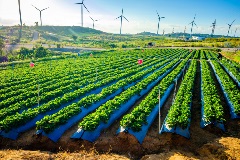The circular way forward could be the key to reducing food waste
Indications that a food crisis is imminent are clear. Fundamental changes in the global food system are required to address these challenges. This decade is a watershed moment for urgent efforts to close the loop, and companies and investors can play a pivotal role. Despite being closely connected to issues such as climate change and basic human rights, food waste has attracted comparatively less attention from companies, investors, and other stakeholders.
ESG Risks of Aging Pipelines for U.S. Energy Infrastructure Investors
Pipelines play a critical role in the U.S energy infrastructure transporting natural gas, crude oil, natural gas liquids, petroleum, and petrochemical products. While these pipelines play a vital role in supporting the U.S economy, investors are increasingly scrutinizing pipeline operators' long-term economic profitability and sustainability practices. A closer look into the status of pipelines reveals a particular issue that investors need to consider.
ESG Investors Consider Socioeconomic Impacts of COVID-19 in the Construction Industry
The construction industry can have a reputation for workforce insensitivity and is highly vulnerable to economic and social variabilities. The ESG Impacts of COVID-19 drive companies to adapt to significant challenges related to the demand for construction services. This construction sector research snapshot highlights relevant social issues that corporations face due to ripple effects from the pandemic using Sustainalytics’ ESG Risk Ratings and Controversies Research.
What Climate Litigation Means for the Oil & Gas Industry
As the global economy looks towards recovery after being impacted by the pandemic, the oil and gas industry faces a growing wave of shareholder activism and climate litigation due to a heightened focus on an accelerated transition as an indirect impact of the pandemic – painting an increasingly bleak picture for those within the industry.
The Why and the How of Socio-Economic Impact Reporting
As CSR has evolved, companies have become accountable to more than just their shareholders. Stakeholders of all stripes are demanding greater accountability and transparency from organizations. Socio-economic impact reporting goes beyond traditional CSR to provide quantifiable evidence of a company’s positive socio-economic impact on its stakeholders.
Sustainable Finance Insights - Climate Adaptation, Biodiversity, Natural Capital, and More
In this monthly round-up of sustainable finance news, transactions, and regulations, Nick and Cheryl discuss the importance of biodiversity, demands for more sustainability reporting standards and answer listener questions.
Royal Dutch Shell Court Order Shifts Paradigm for Corporate ESG Accountability
On 26 May 2021, the Court of The Hague orders Royal Dutch Shell (RDS) to reduce CO2 emissions to a net 45% by the end of 2030 compared to 2019 through the Group Policy of the Shell Group. The order of a national (Dutch) court demands that a global company (RDS) fulfills its obligations under the Paris Climate Agreement, although RDS was not a party in that agreement, and there is no legal equivalent in The Netherlands. What are the broader consequences of this order, also globally and for other companies and potentially also other jurisdictions?
ESG Disclosure and Performance in Southeast Asia
Strategically located at the centre of Asia Pacific, with a young population of more than 675 million across 11 countries, Southeast Asia is an economic block with one of the world’s fastest GDP growth rate. In recent years, the region has been attracting the attention of global investors. At the same time, in the context of responsible investing moving from a niche activity to the mainstream, research on the environmental, social, and governance (ESG) performance of Southeast Asia companies is limited. In this article, we have a deeper look at the ESG disclosure and performance of major Southeast Asia countries, focusing on the ASEAN-6 countries (Singapore, Malaysia, Thailand, Vietnam, Indonesia, and the Philippines).
Banks Embrace Corporate Culture as Change Agent
Corporate culture is not automatically positive, and elements of a company’s culture may provide certain benefits or disadvantages to a firm’s competitiveness. When acknowledged, corporate culture can be used as a tool to drive better business outcomes and manage conduct and compliance risk. Our discussions with companies show that corporate culture can have a dominant effect and influence behaviour over and beyond stated company policies and programs.
Bringing Investors and Companies Together to Address the Climate Change Crisis
As Earth Day is around the corner on the 22nd of April, the Biden Administration is to convene a global climate summit. Following a historical precedent for several such events, since its inception in 1970, including signing the landmark Paris Agreement . We have seen positive developments since the Paris Agreement; societal actions to address some of the root causes of climate change have yet to suppress the negative trends . Historically, active ownership on climate change has focused on direct emissions from highly exposed sectors, such as fossil fuel and utility companies. However, the more complicated, less direct aspects of climate change have seen limited progress. Tackling such issues will see a strong need for collaboration from both countries and other key sectors, in particular, banking and finance. Banks are key to support this transformation; facilitating economic activity for positive change throughout the entire value chain is key.
Deforestation and Biodiversity Loss Highlight the Need for a Better Normal
The world is aching for a return to normality after a year (and still counting) of news bulletins being dominated by the COVID-19 pandemic; Earth Day 2021 should serve as a stark reminder that we cannot go back to business-as-usual. We must address the vast environmental challenges facing humanity, such as climate change, loss of biodiversity, extreme weather and issues related to water.
Personal Products and the New Ethics of Product Naming
Over recent years, personal product (PP) companies have faced an increasing demand for more inclusive product governance – from formulations to labels – and marketing that reflects the diversity of consumers. To grow sustainably within their communities and stay relevant for their target customers, such companies need to create value for society proactively. Some of the major players in this industry have already started paving the way for others.
Corporate ESG in Focus: An Overview of ESG and its Impact on Companies
With climate change and social justice concerns increasingly dominating headlines, environmental, social, and corporate governance (ESG) factors are no longer treated as trivial issues confined to a company’s CSR department. ESG is now central to a company’s financial performance and reputation.
10 for 2021: Investing in the Circular Economy
This report aims to support investors interested in gauging environmental, social and governance (ESG) risks and opportunities in the global food value chain. We survey key subindustries – from agrochemicals, agriculture and aquaculture to packaged food, food retail and restaurants – in search of solutions that may support the principles of the circular economy (CE). These principles include minimizing waste and pollution, extending the use-phase of products and ecosystem regeneration. Some of the key insights found in the report are:
Lessons Learned from 926 Engagement Meetings in Emerging Markets
When Sustainalytics (GES[1]) initiated the Emerging Markets (EM) Engagement program as a pilot project in 2009, the scale, scope and impact were undetermined factors. Based on the successful execution of the program methodology in the African and Middle Eastern regions during the pilot stage, the full program launched in 2010 to cover all major emerging markets. After the project close in July 2020, the program accounts for 926 meetings with companies in emerging markets.



















